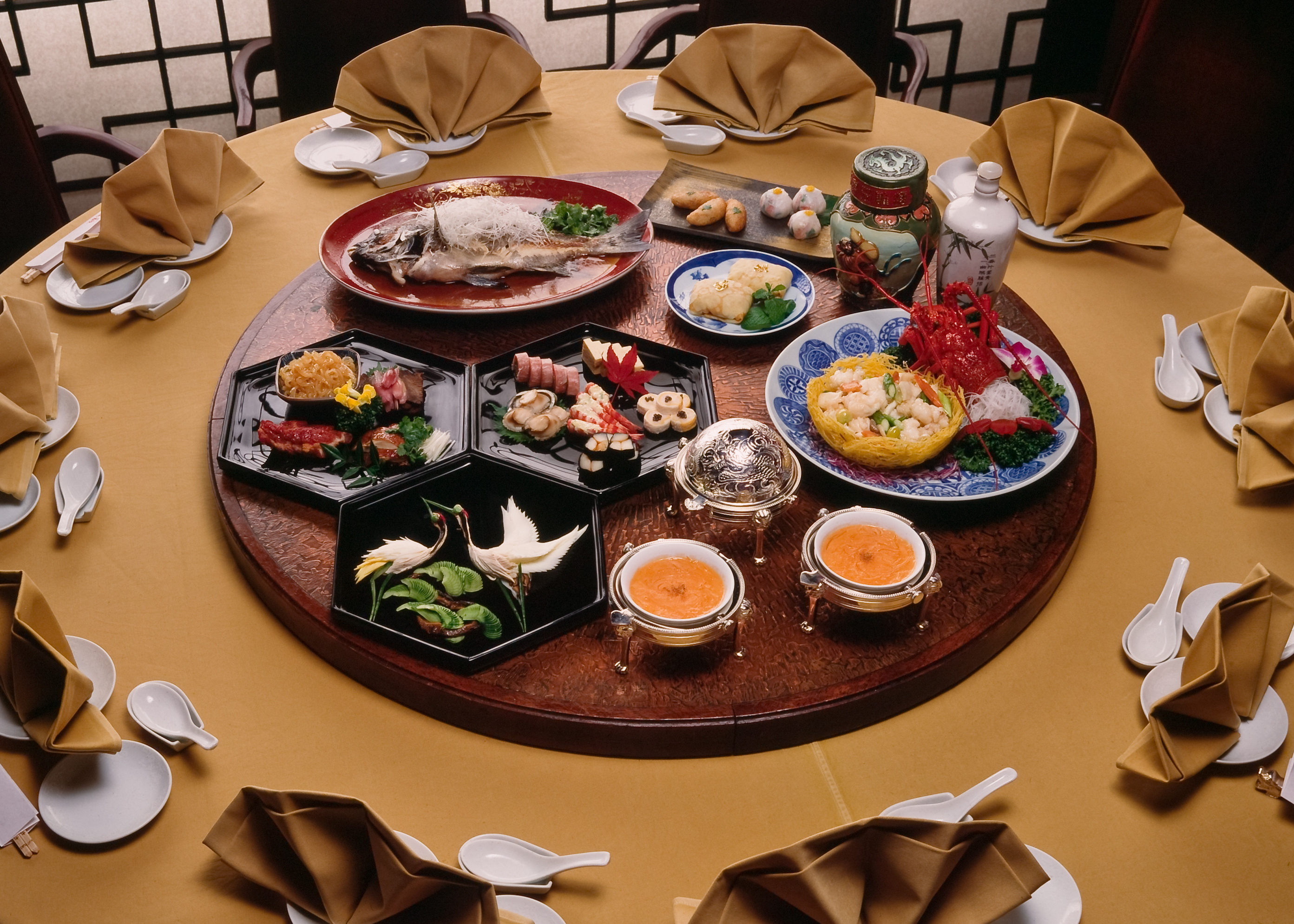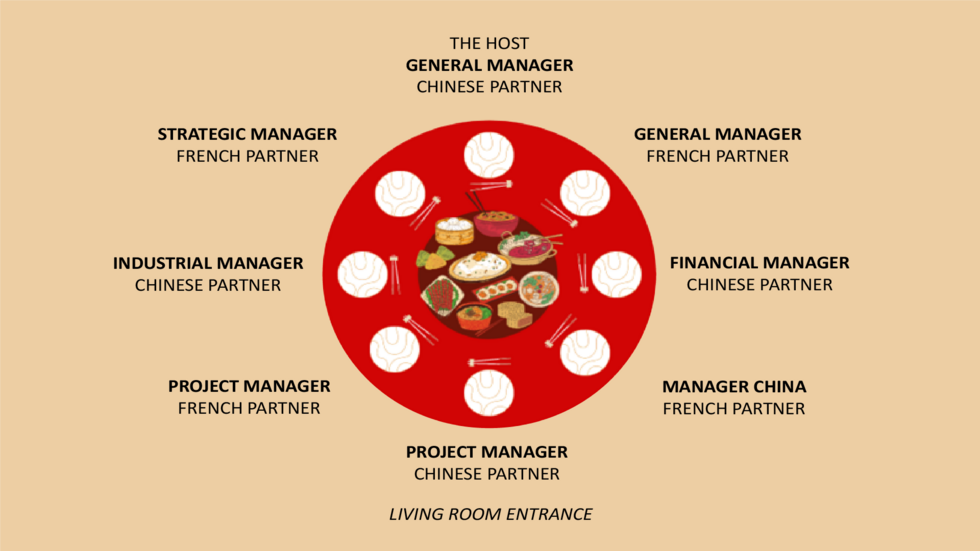A ritual in China: the business meal
French and Chinese people have in common the pleasure of the table. The Chinese business meal is the time to build personal relationships. But be careful, the rules are different.

After many years in China, Stéphane, intercultural consultant at Akteos, shares with us his secrets for a successful business meal.
If you are a foreigner, it is of course accepted that you do not know the rules. You will be forgiven for your blunders, especially if you are just passing through. But if you know the rules and apply them, you make a very good impression. You give face to your host, you give him importance, and this is a good sign for business.
Be careful, these are not the times when we talk about work! It could happen that at the end of the banquet, we take advantage of it to pass on two or three messages, but normally we concentrate on building trust in a game of mutual attention.
These business meals start between 6:00 and 6:30 pm. The host will welcome you. Punctuality is a must and do not arrive late, although ten minutes may be tolerated.
Business banquets are held in private rooms that most restaurants offer. This is more comfortable because the Chinese can be very noisy; making noise is a sign that one is having fun in China. "Having a good time" is called "Renao" in Chinese: "Re" means hot and "Nao" means noise!
The Chinese culture is a culture of hierarchy and therefore of place. Everyone has his place and harmony is preserved.
The dining tables are always round, and are usually set for 8 to 10 people. If you are very numerous, there could be a "senior" table and a "junior" table, but if everyone is more or less senior, you will have to plan a larger table. In the center of the table is a turntable on which the dishes to be shared will be placed. Each person will serve themselves with a serving spoon, and will put the pieces in their small plate in front of them, which they will eat with their chopsticks. If you don't know how to use chopsticks, ask for a fork, you won't need a knife because all the dishes will be cut in advance.
The seating plan has very strict rules. Let's take an example. You are the director of a French company and you are accompanied by your Strategic Director, a member of the Management Committee, by your China Director and by the project manager in charge of operations for this partnership. You are invited by your Chinese partner, represented by its General Manager, its Financial Director, its Industrial Director and the project manager in charge of the technical part of the partnership.

It is always the host, the General Manager of the Chinese partner, who takes the best place, the one facing the front door with the wall in the back; honor to the one who pays! He will place his guest of honor, the General Manager of the French company, on his left and his second guest of honor, the Strategic Director, on his right. It is the turn of the other major figures in the company to take their places. The 4th place on the left of the guest of honor and the 5th place on the right of the second guest. But the financial director of the Chinese partner is older and has more seniority in the company than the industrial director, he will take the 4th place and the industrial director will take the 5th place. The Industrial Director could possibly invite the Financial Director to the 4th place to signify his seniority and give him face.
Then come the last three places to be distributed. The 6th place is then given to the China Director of the French company, on the left of the Chinese Financial Director and the 7th place is given to the French project manager, on the right of the Chinese Industrial Director. The Chinese project manager gets the last place, facing the host, with his back to the entrance. As he is the one who is closest to the entrance, he will also play the role of steward with the restaurant staff. He will give instructions to the waiters according to the host's requests and he will pay the bill at the end of the meal.
Obviously, there is no one right answer. The layout can change, especially when the tables are larger. Perhaps also depending on affinities that have already been created before, in which case the placements could vary in the "low" part of the table, but never in the "high" part of the table, where the host and guests of honor are placed.
Beginning of the banquet: discovery of the Chinese gastronomy
The host should sit down first with his guests. Only afterwards the other guests can be seated. The host will also be the first to toast all his guests, with special emphasis on his special guests. This toast is usually done standing.
The host is the one who invites, so he is the one who orders the dishes. If he wants to give a lot of face to his guests, he will choose many dishes and expensive ones. Most of them will be to your taste because Chinese food is often excellent. But you will also have the right to some unusual dishes, improbable culinary fantasies that might offend your western sensibility: duck heads, chicken feet, stinking soybean paste, turtle soup, live shrimps, grilled bees, worm quiche, the list is very long. As the Cantonese say: they eat everything on all fours, except tables and chairs.
Because of the vastness of the territory, there is not one but several Chinese cuisines. Apart from the four main ones (Cantonese, Pekingese, Shanghainese and Szechuan), there are still regional and even local cuisines, more or less in line with our Western tastes. I remember a meal in Wuhan. The host had really wanted to impress us by proposing 30 different dishes when we were only ten guests. None of the dishes was edible to my taste: this meal was a real ordeal. But this kind of experience is quite rare, as Chinese food is generally delicious, and much better than the Chinese food offered in Europe. If you are offered a dish that offends your taste or your culinary habits, taste it with your lips, say that it is good and leave it on your plate. Your host will see that you don't like it, but he will notice your politeness. Honesty is a bad habit in China!
One of the principles of Chinese cuisine is that it should appeal to our five senses. Taste and smell, for cooking, it is quite obvious; but also hearing, by pouring oil or boiling water at the last moment to make the dish crackle. The sight, too, with a careful preparation of the dishes, as well as the touch, i.e. the texture of the food. Chicken pasta falls into this category: the cartilage crunches under the tooth; an interesting texture for the Chinese.
During the meal, be considerate of the other guests, especially your main partner. For example, give him some face by serving him as soon as the dish arrives, especially when the dish contains a better piece, offer him. Tip: for the Chinese, the best piece of fish is its head, which is not so much in our habits in the West, so rush to serve it to him, you give him some face and you get rid of it!
Trust is created mainly through reciprocity. A game of give and take is established. Give to receive and receive to give. So don't hesitate to give face in return, for example by serving your obliger in turn, or by calling the waiter to fill your partner's glass.
- Do not talk with your mouth full, try to close your mouth as much as possible. However, you can drink your soup by sucking loudly: this is to cool it down.
- Try to keep an upright posture, with your elbows turned inwards. Avoid invading your table neighbors.On the other hand, once drunk, the postures are loose...
- Do not finish the dishes on the turntable, as this would be like telling your host that he has not ordered enough.
- Don't play with your chopsticks, for example by pointing at someone or sticking them in your rice.
Drink and get drunk: Baijiu and raw eggs
This is a very important part of the business meal in the evening. "No alcohol, no business" a client once told me. Don't worry, it's not always like that, but it can happen. The good news for women is that they have the right not to drink, even if the host would appreciate it if they did.
There may be different habits in different regions. Generally speaking, people drink more in the North than in the South, in the less developed regions in the West than in the big coastal cities. In general, people do not drink at lunchtime but only in the evening. But there will be exceptions, so be prepared.
The general idea is not to taste excellent wines, unless you sail in very distinguished circles. But I used to sell drills in China and my customers were industrial suppliers, big hardware stores... The idea is rather to get drunk quickly, to let go. English speakers have an expression for this, it's "binge drinking". The most popular drink to accompany banquets is "baijiu", literally: "white alcohol". It is a brandy with an alcohol content ranging from 40° to 70°! It is obtained by distillation of cereal wine, based on sorghum (maotai, erguotou, meiguilu jiu), for the best quality, but also often mixed with corn, wheat, barley or millet, for the inferior qualities. Beer is also often offered, sometimes cognac; nowadays wine is also served.
The game is to invite the other person, your partner, your guest, your host, everyone, to drink by raising your glass with him. If you want to make it a bit more elaborate, you can also stand up, especially at the beginning of the meal, when you are still in good spirits. You can also give him even more face by saying something nice to him. Then you invite him to drink, most often by saying "gangbei", which means "dry ass". You usually touch the glasses to signify that you will drink every last drop.
If you are the one who initiated the toast, it is a gesture of attention and flattery to the person you are toasting. In this case, you will touch the glass underneath your guest's glass to indicate your low position. After drinking, you may tip your glass over to prove that you have drunk the entire glass.
Many foreigners don't like baijiu but you have to deal with it. Personally, I lasted four years. But after a drunken coma in Shenyang, in the North, I couldn't drink it anymore. I had to convince my hosts or guests that I could accompany them in their drunkenness but with beer. The alcohol level was obviously much lower, so I had to give them pints of beer in exchange for their little glass of white alcohol. It was hard but I could handle it because I had lived in Germany just before!
The worst was some business meals in Beijing. Some Beijingers have the habit of breaking a raw egg in the pint of beer. The egg falls to the bottom of the pint and when you drink it in one go, which is already a challenge, you see the raw egg coming down. With courage you finally swallow the still homogeneous egg as a last sip. If it is your customer who asked you for it, think about the order he is going to give you next, it can help!
When you are the guest from abroad, you are naturally very busy with all the toasts of the other guests. Try to return the toasts anyway, and if it's too much for you, you can also toast everyone by thanking them for their welcome and the good time, the excellent meal, etc.
End of the meal
The end of the meal is often sudden. You are having a good time and suddenly your host says a last word, gets up and leaves the room, with the other guests following him. So be careful, if you want to return the courtesy by toasting your guests or your host one last time, anticipate the right "timing" before it's too late or get help from a Chinese collaborator.
If you see the people who attended the banquet the next day, don't say a word: the guests' state of inebriation is not to be recalled. Act as if nothing had happened!
